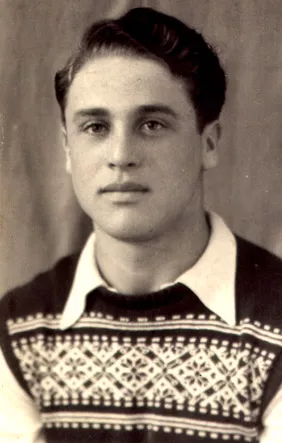My husband Semyon Leiderman photographed on his 14th birthday, in July 1940. This photo was taken in Luchinets village Vinnitsa region.
I got married in 1952. Our neighbor introduced me to her distant relative Semyon Leiderman. There were not many young men around: many perished at the front and the others - in ghettos. Shortly after we met Semyon proposed to me. Semyon was born in Luchinets village in 1926. His Jewish name is Shmul. His father Haim Leiderman was a burial man at the Jewish cemetery in Luchinets, and his mother was a housewife. Semyon had an older brother Yefim and a younger sister Anna. Semyon's parents were religious, but their children were far from religion like many others of their generation. During the war Semyon and his parents were in the Jewish ghetto in Mogilyov-Podolskiy. His older brother was at the front. Before the war Semyon had finished 8 forms of the Russian general education school. After the war Semyon stayed in Mogilyov-Podolskiy. He went to work as a turner at the mechanical plant, which was later converted into the plant of agricultural machine building named after Kirov. Yefim returned to Mogilyov-Podolskiy after the war. Anna got married and moved to Batumi in Georgia with her husband. Her husband's relatives lived in this town. Her husband died a sudden death. Anna's mother moved to Batumi to live with her daughter. She died in the middle 1970s.
We didn't have a Jewish wedding. Life was very hard and we could not afford a big wedding party. We registered in the registry office and in the evening had a small wedding dinner with the closest relatives. We lived in our little house with my parents and my younger sister Nyusia after the wedding. Our older son David was born in 1953, and our daughter Maya was born in 1957. We did not raise them Jews. We spoke Russian with the children. I spoke Yiddish to my parents and my husband and I switched to Yiddish, when we did not want our children to understand the subject of our discussion. We celebrated Jewish holidays, when we lived with our parents. Our parents also celebrated Soviet holidays with us: 1 May, 7 November, Victory Day, Soviet army Day, the international Women's Day in 8 March. In the early 1960s the plant where my husband and father were working built an apartment house for its workers and we received apartments in this house.















